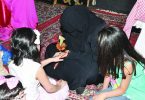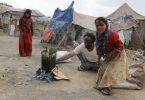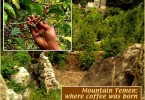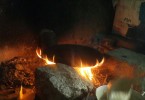By Rabab Ayash - NYN staff
In a homeland where security has been robbed, even walls start to tell stories of peoples’ sufferings in this conflict ridden country. Yemen has recently proved to be easy breeding ground and havens for heartbreaking stories.
It is believed that the ongoing escalation of the war in Yemen has crossed the point of no return.
As the war escalates, several dozen civilians, including children are killed every single moment because of the Saudi-led coalition almost-continuous airstrikes on Yemen as well as the mortar shells and rockets fired indiscriminately by Iran-backed Yemeni Shiite Houthi rebels and their allies into populated areas, such as in Taiz(editor’s note: While Taiz is in government hands, it is besieged by Houthi militia).
Many are burned alive by the inferno of fear, hunger, displacement, illnesses and all the gloomy scenes that results from the rapidly escalated crisis in Yemen.
Recently, All what you can hear in Sana’a is people calling residents to leave the city which is heavily targeted by the Saudi led coalition airstrikes.
Sana’a is one of the most populous cities in the world with approximately 3 million residents. Therefore, evacuating the city from this huge number of residents is of great difficulty. Only handful of residents answer the repeated calls that ask people to leave Sana’a to save their lives.
Yemeni Women and Children Escape the war zones to the unknown.
Ali’s family decided to leave the city of Sana’a after their neighbor’s house was bombed on the 19th of September. The family was extremely horrified.
“It was 2 am when we started to hear the war plane roaming on the city as usual. We did not feel afraid as we become accustomed to this situation. It wasn’t until we heard a huge explosion that we have never heard before. Our house was strongly shaken. We decided to leave the house and travel to Aden to stay with my brother there”, said Muna Ali, a 23 year old lady.
It was an escape to the unknown. That is what we understand from the hardships that faced Muna and her family during their journey to Aden.
Many of Ali’s friends had warned them not to travel to Aden which is 184.8 miles from Sana’a as they do not allow anyone from the northern part of Yemen to enter the south.
In Yemen, It becomes hard if not impossible for northern people to enter the cities in the South. Many security check points have been appointed by the southern movement along the road from Ad Dali to Aden. We were left hopeless until a man from Ibyan ( a southern city ) offered to help us reach the city of Aden. We were all females except for the driver.
The road was all fine and we traveled safely until we reached the first security check point in Ad Dali.
About four fully weaponed, very young men stand next to the old flag of the South part of Yemen.
Socially, In Yemen, it is a taboo to stop a car that has women and children in.
“I was astonished. Those guys should not stop us. It was my first time to be stopped in a security check point. I was very angry,” said Muna.
Muna continued, “we stayed for a long time till our turn came. Approximately all the cars that were ahead of us were forced to go back. I heard an old woman shouting and swearing with tears filling her eyes that she is from the south. No one paid her any attention.”
“One of the guys told her to go away from his face as he wanted to do his job. She did not listen to his warning and angrily the guy took his gun and threatened her. All the men in that checkpoint gathered around the guy and stopped him. They all condemned his harebrained behavior”, said Muna.
Muna continued, “the guy’s friends came and apologized on behalf of their friend for the old woman and the men gathered.
It is hard for me to describe my feeling that moment. Gazing at that horrible scene I started crying. Our driver though he is one of those who call for independence of the South could not bear the scene. He got out of the car and started to shout on the guy. The two men began to clash with hands, upon that, everyone rushed to break up the clash.”
When Muna witnessed all that she thought for a moment not to continue their journey to Aden.
Muna continued, “when our turn came, I took a deep breath. My heart started to beat a bit fast. I will not be exaggerating if I say that it was the darkest moment in my life.
A man came closer to the car and asked the driver for his identity card. The driver handed it to him. Asking the driver several questions, he left him go.
We were happy that we passed that checkpoint safely, but, to our surprise that checkpoint was only one of hundreds to come.”
Muna said, “all the checkpoints were asking the same questions. Where are you from? Where are you going? Is there anyone from the north?
Luckily, they were not asking for the official documents of the passengers only they asked for the identity card of the driver.
We were starving of hunger. The driver decided to look for a restaurant to have dinner. It was 3 am. We looked for a restaurant in the whole city of Al Dali. All were closed as they all were owned by people from the north.
Al Dali is a city where it is impossible to find a person from the north. They kicked out all the Northern people.”
“After all the inconveniences that we have received throughout our long journey from Dali to Aden, we reached Aden to see what we have never expected to see. Aden is no longer a beautiful city. Damage is everywhere.” Muna adds.
The number of needy people in Aden has increased rapidly. Most of the beggars you find in the public places and streets are woman and children.
Hundreds of families here lost their breadwinners in the war. They are in desperate need and have nowhere to go.
In Yemen, many people have so far been directly killed by the violence, but thousands more face death and impairment due to the secondary effects of this war – not least of which is hunger, malnutrition and disease.
Talking about those who lost their lives in the war, “They are lucky.” Said Leena Al Yafiai, a 33 year old breadwinner women from Aden who has lost her husband in the war.
“To die a quick death by bullet is way better than a slow death from starvation. If they die once we die several times every day”, Leena said, sadly.
“I go to street every morning to collect money and food for my family. I wouldn’t do this if my husband was alive. What should I do? Should I leave my children die of hunger?. Leena asked.
Women in Aden face many challenges, “The overflow of cesspits on the city streets is one of the most challenging problem that irritate everyone here. It results in the spread of many serious diseases among the city residents. It starts to hinder our movement,” said Alaya’a Mohammed a university student from Aden.
“Quick actions should be urged to stop this problem otherwise the city is likely to witness a series of endless diseases”, she adds.
Women Fighters Join the Popular Resistance in Taiz
In Taiz, the first batch of women fighters which consists of dozens of women who received military training in the use of weapons and martial arts have recently graduated and will be joining the ranks of the Popular Resistance in the province of Taiz.
“We are left with no other solution. We should fight to dislodge the siege. Protecting Taiz and kicking out Houthi rebels is the responsibility of everyone here, men, women and even children. Taiz deserves nothing but our souls and bodies“, said Amal Naji, a 24 year old lady from Taiz who is looking to enlist herself in the popular resistance.
Women and children in Taiz suffer the most in this war. They suffer from the lack of the very basic things most of which is the lack of drinking water. In Taiz, according to international reports, about 830 children are left with no breadwinner. Women and children in Taiz are witnessing a slow death. Water trucks are not allowed in.
“It’s been over two hundred days. How much longer will they wait? They’ll probably be in the same place for a few more months until any outside help gets there. That’s a long time”, Amal comments on the crisis of drinking water in Taiz.







